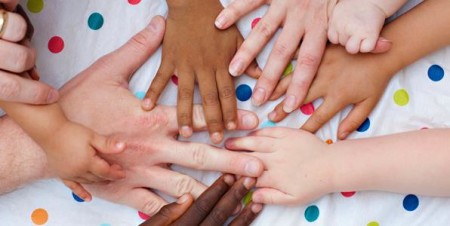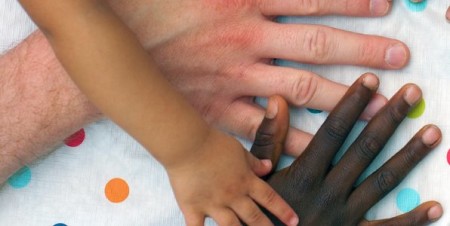When my husband and I decided to adopt, we knew we were becoming a transracial family. During the lengthy wait to be matched with our Liberian son I joined educational groups to learn how to appropriately care for African hair and skin. I read books about being a transracial family and the experience of transracial adoptees. I bought brown dolls and African music and storybooks that had brown kids as the main character. I collected African recipes to try. We knew that we could never duplicate the experience of growing up inside his own culture with people who looked like him, but we wanted to do the best we could to embrace his history and his people. We wanted him to know that we valued his culture and that we wanted him to value it, too.
While we were already a transracial family when we became foster parents, we were still a little blindsided when we took our first foster placement. We got the call about a baby who needed a home and for very important legal reasons (ICWA) it was immediately disclosed to us that this baby was Native American. All of the months I had in the adoption process to prepare to add an African to our family and now we were just a weekend away from adding a child with a totally different culture and history from either ours or or son’s. And I was totally unprepared.

All photos by Rebecca Tredway Photography
It has been a crash course for us in learning what it means to be Native American and value Native American culture. We now care about issues we had no concept of before. We’re interested in a new history, we buy a new kind of books, cook new kinds of foods, and talk about current events in our son’s tribe. I watch documentaries on Native American issues and reservation life with a new passion because this stuff matters to my family.
In the years since the placement of our Lakota son we have also fostered and adopted a child with Mexican heritage and a biracial daughter (African American/Caucasian). We have become educated in new ways, learned new cultures, and we are doing our best to help our children value who they are and their history.
But that will never be the same as growing up inside their own culture. We realize this is a loss to them and we can’t make up for that loss by claiming that “we don’t see color.” The degree to which we love isn’t impacted by color, but culture and heritage matter to the kids and families we’re working with. We have to understand that our own desire to not acknowledge race won’t keep race from having an impact on our children.
I believe raising a child from a culture that isn’t your own is a commitment to an educational process. You have to be a humble student as you seek to understand a new worldview and embrace a new identity for your family. This is no small task and I have failed many times over, which is why I believe foster parents need to feel comfortable asking about the race of any potential placements.
We often think about the ages of kids we could care for or the medical needs we could handle, but we rarely think about the needs for racial sensitivity and understanding we encounter when we foster a child. As much as we want to be “colorblind” in accepting whatever child needs us, we have to acknowledge our own abilities, strengths and weaknesses when it comes to understanding a child’s racial experience.
. . . to finish reading, click over to Her View From Home. . .


2 Comments
Leave a reply →